- Home
- Phil Geusz
Lieutenant (The David Birkenhead Series) Page 6
Lieutenant (The David Birkenhead Series) Read online
Page 6
We also found no more booby-traps, which puzzled me at first. Nor did we at first encounter many corpses outside of the engineering spaces, which had been hit hard and often by the Imperial line-of-battle ships. Then I also noticed that there were no signs of a firefight anywhere within the Station, and I began to think that perhaps in this case two and two equaled five after all. Finally I dropped in on the chief, who was now living aboard the Station full-time, and caught him alone. “Hi, David!” he greeted me with a big smile. He was lonely—there weren’t a lot of people aboard Zombie just then who were up for much in the way of conversation. “What’s new? Care for a bulb of coffee?”
My stomach lurched at the idea—not an hour before I’d accidentally sunk my left foot into something truly awful while pushing off for a long glide down a corridor, after forgetting to exchange my sandals for rubber boots. I still reeked of disinfectant, which as nasty as it was remained far more appealing than the alternative. Besides, I didn’t like coffee to begin with. “No thank you, sir,” I replied, glad that my fur hid the nasty green cast that my flesh was probably taking on. Then I paused, not quite certain of how to continue. “Sir… Is there something about Zombie Station that everyone else knows except me?”
Lancrest’s smile faded, but he said nothing.
“I assume you’re sworn to secrecy,” I continued. “You all must be, or else by now someone would’ve said something. But… There’s not much evidence of a fight after the main armament went down. I’m finding next to no bodies in the living spaces, where I figure any last stand should’ve taken place. And the Imperials claim everyone committed suicide.” I paused and met his eyes. “Just like they also claimed in the last war. This ship cleaned up after that one, too. And most of the same personnel are still in place.”
“Hmm,” Lancrest replied, looking away.
“I understand if you’re sworn to secrecy, sir. My Rabbits won’t discuss the matter, so I know there must be something going on. But… Sir, at some point don’t you think that someone ought to be telling me these things?”
“Well,” he said slowly, looking away again. Nothing more came out of his mouth, though.
“Sir!” I continued, growing angry. “I’m not that stupid. Not one Imperial body has been found in the Station proper yet. How can this be explained?”
Finally Lancrest sighed and stuck the coffee-bulb to his desk. “This is the captain’s job,” he finally said. “And by rights I ought to make him do it; he should’ve seen this situation coming weeks ago. But I know how busy you are, David. There’s no point in making you report to him back aboard the ship. And it’d be even worse if he came over here.”
I nodded; that last bit certainly needed no further explanation.
“So,” the chief continued, licking his lips nervously. “Keep in mind that you figured this out all on your own, son—I could be hung for breaking a secrecy oath at this high a level. Got that?”
I nodded. “Of course.”
He smiled. “Good. In that case… David, awful things happen in battle. Terrible, indescribable things. As you already know better than most, of course. Men find themselves tested in ways that they could never have anticipated. Sometimes they break. When that happens… Well, to be blunt, from time to time we find evidence of bad behavior on the part of our men. Once, for example, a Rabbit found a dead marine with a pouch full of left ears in his pack. They were being kept as trophies, as some men used to keep scalps. Two others in the same squad were saving ears, too. One was the NCO.”
I winced. “What’d you do?”
“What society wanted us to do, David. Which was what was right for the bereaved survivors back home. I mean… The men involved were beyond punishing. What could a court-martial achieve? And the mutilated Imperials were already dead, too. So what possible good would publicity do anyone, except to further wound the innocent bystanders back home?”
My eyes closed, as if of their own accord. “So, the ears simply vanished.”
“Of course!” the chief replied. “How could it be any other way? And as a result, somewhere there are orphaned kids growing up who’re still proud of their hero dads.” His eyes narrowed. “Now… You know the Imperials don’t take prisoners. To them, surrender is an act of inexcusable weakness—to wave a white flag is to elicit their deepest contempt. So… Do you know what the Imperials do if you try?”
“I’ve heard rumors. Ugly ones.”
“They’re true,” Lancester replied. “I’ve been involved in cleaning up after them. First they disarm you, then out the airlock you go. To surrender means drowning and exploding and flash-burning and vomiting your guts out all at one and the same time. You remain conscious far, far too long. And that's the best you can hope for; our enemies are capable of much worse.” He shook his head and sighed again. “Death in combat isn’t much to write home about either, David. You’ve seen enough of it already here to appreciate that. So, once the situation turns hopeless some choose another way. Quite a few, actually. In the case of Zombie, they’ve clearly done it in an organized manner.”
“And we won’t tell the folks back home, because it’s easier for them if their loved ones died heroes?”
“That’s only part of it, David. There’s other reasons, too. One, for example, is that mass suicide is bad for morale. It’s not something you want the other troops hearing about, especially the ones who make up the new garrison. People at home need heroes, too, and they’re growing more important to morale with each war we lose. Again, you of all people ought to know that.”
I nodded—it was true enough.
“Besides, it’s a lot easier to get funding to rebuild a Station where everyone fought to the death, rather than one where a large, well-trained and fully-armed garrison blew its own brains out due to sheer terrorized hopelessness. Wars are won and lost at the Treasury too, never forget.” He sighed. “Though I expect that this was the last time we’ll ever try to hold Zombie. No matter how large the turrets are and how thick the armor, a fixed fortification can always be defeated by enough ships and men. Destroying is always easier than protecting. The only effective defense is a relief fleet, which just isn’t going to happen this far out. Not until we start winning more fleet engagements, that is. And don’t hold your breath on that one!”
I opened my mouth to speak, then closed it again. There was something terribly wrong with this whole situation, but I couldn’t quite get a handle on exactly what. Until that happened, the navy had taught me well as to what my response should be. “I see, sir.”
“We’ll all be Imperials by and by, the way things are going.” He pointed towards the ceiling, where most of the Station remained as yet unexplored. “I’ll tell you what, son. I predict that you’re going to find most of the rest of the bodies on the mess deck, all neatly drilled in the forehead with their own blasters. That’s how it was last time. They’ll be in their best uniforms, all except a handful who were on watch, and all will have last letters to their loved ones tucked in their breast pockets. Which will never be delivered, of course. For the greater good.” He shook his head. “When you find them, call the captain and pretend we never had this little talk. He’ll tell you what to do from that point forward, and make you swear the same oath I did.” He grabbed his bulb of coffee and took a long, deep sip. “God, what a filthy business we’re in, David! On every last stinkin’ level!”
13
Up until my arrival at Zombie Station, I only rarely experienced nightmares or difficulty sleeping. But that changed like a switch had been thrown the moment we Jumped into Zombie space. And of all the terrible, miserable tossing-and-turning sessions that passed for an evening’s rest during my time there, the worst was the one immediately following my little talk with the chief. Every time I started to drift off I soon found myself floating helplessly about the Station’s mess deck, dressed in my finest uniform and with the wind whistling through my empty skull. It was dark and cold and endless and all we marines were rotting together in a
floating mass, bumping and grinding and shedding corrupt tears from eyeless sockets and…
…then I’d wake up screaming, once so loudly that Fremont came a-knocking at my door to reassure himself that all was well. Finally, after three repetitions of this same dream I sighed, sat up, and accepted that I simply wasn’t going to be getting any rest that night.
While I could’ve and perhaps even should’ve spent the wee hours looking in on Devin and his ongoing round-the-clock operations, I took some advice from my father instead. He’d explained to me when I was little that dreams were ideas buried deep in the mind that were struggling to get out, and the more powerful they were the more important it was that we should try to understand what our subconscious was trying to tell us. So I got out a blank note-pad and my Marcus heirloom pen and went to work.
The first thing I did was to make a list of all the things that persistently nagged at me, that basically felt wrong about the situation I was in. I free-associated so that everything from the fact that at least in some things the Imperials were more trustworthy than my own people to what a miserable waste of space my superior officers were all appeared on the same page, in no particular order. And what a list it was! The longer I kept at it, the more sweeping my indictments grew. “The entire navy’s riddled with incompetence,” I found myself scrawling at one point. “Hardly anyone seems to understand even the basics of how to lead men, much less fight a war. Instead all they care about are their Houses and estates and gaining a noble title of their own. Or maybe about whiskey and rape if they’ve given up all hope of advancement. The Imperials aren’t supermen—they’ve just figured out what it takes to win, is all, and they’re willing to sacrifice everything else to make it happen. For them, victory is more important than risks and losses.” And, later. “His Majesty understands what’s wrong—that’s obvious in retrospect. You can tell by how he’s trying to force changes on the Academy and teach no-holds-barred strategy there instead of ballroom dancing. So do James and Lord Robert and a few others. But the problem is so huge and pervasive… What can any single person, even a king, do about it? How can you reform something this big and entrenched?”
Then I went into my concerns about Zombie itself. “It all makes sense now,” I noted to myself. “And it’s all the officers’ faults. Or maybe it’s the fault of those who trained the officers—who can say? But they just… Gave up! Quit, folded, allowed every last one of their men to die for nothing. What kind of intellectually bankrupt leader can’t do any better than that? Then the Imperials said practically nothing about it, to encourage us to sink yet more credits that should’ve gone to warships into rebuilding and re-garrisoning the place even stronger than before. It was a huge sucker trap! That’s why they always let us keep Zombie at the peace talks and don’t circulate videos to make propaganda of the fact that our men committed suicide—it’s because they know they can deal with the place any time they like, and that because our officers are so crappy it’ll cost them far less to smash it than it did for us to rebuild it! We’re that predictably incompetent!”
Which of course begged the question of how I would’ve defended Zombie Station, once the main guns were silenced. I spent almost three hours roughing out a series of ideas. While the Station would always fall in the end without relief—the chief was right about that—by the time I was done I was quite certain that with a little creativity and genuine leadership the place could’ve remained a deep thorn in the Imperial side for weeks if not months, instead of the few days it’d actually lasted. Which would’ve translated into huge logistics problems for the Imperial Navy as a whole, since their supply ships would’ve all had to take longer routings. At least one or two planetary invasions would’ve had to have been shelved, and the Imperials could never have raided as deeply as they actually had. Which in turn would’ve meant that our Fleet could’ve remained more concentrated and…
My god!, I suddenly realized, putting down my pen in wonder. We might even have actually won the war!
14
By the time we worked our way to the main mess deck and found the situation there to be exactly as predicted by the chief, I was already lower than I’d ever been before in my life. Lieutenant Jeffries had found another way to force more of his work upon me by claiming he was too busy with the half of his paperwork that I wasn’t already doing for him to go inspect the Station’s damaged turrets, and since it wasn’t work that even our best-trained Rabbits could handle I was compelled to take on the task personally. By this time we had all the main airlocks up and working, so it was easiest for me to take a one-man sled and flit around outside the Station rather than make my way up and down the endless miles of corridors inside. Having the sled made it easy for me to snap my documentary photos of the many Imperial blaster-hits, and then it only took me a few minutes to lock on, take more photos from the inside, and download the error-log from the control gear. These logs made interesting reading, actually; they served as brief histories of the fighting. It’d taken direct battleship hits to knock out the turrets, and in many cases more than one. The far-aft mounting had through sheer luck absorbed no less than five before succumbing, and even then the final blow had come via close-assault by a demolition team. This explained nicely the Imperial midshipman we’d found dead with his sidearm wired to a heavy charge, and also the corpses of a few others armed with hand-launched armor-piercing missiles. One was even carrying a live tactical nuke!
As anticipated, it proved most sensible to relocate our body-processing efforts to the Station proper, especially after we encountered so many dead together in that one single spot. After the captain swore me to silence (what was I going to do? Refuse a perfectly legal order?) I spent most of my days there supervising and helping with the ongoing cleanup, doing everything from rendering the nastiest weapons (like the tactical nuke) safe to manning a scrub-brush. The Rabbits seemed terribly grateful for the help—they were working as long and hard as I was, and the strain was telling on them too. Devin was in the worst situation—our latest projections showed him finishing up a week to ten days after the rest of us even if everything went perfectly for him. Which it didn’t, sadly—a dead marine’s grenade went off while two of our best bunnies were securing him to their sled. Franklin and Ulysses were both killed instantly, and the sled was a total write-off as well. At first the captain complained when I personally went out to recover all three of them—he wanted me to write a special report on the turret that’d survived five hits instead. But my suit had radio trouble until I was almost there—curse the unreliable things!—and when I got back Fremont jiggered things so the malfunction actually looked genuine. I also shut down the entire recovery and cleanup operation for twelve hours to review safety procedures, as well as to allow for grieving. Devin cried his eyes out as he processed his friend’s bodies, then tossed them into the Station’s incinerator. And so did I, even as I seethed in rage. These Rabbits—my men, my friends, slaves just like I’d once been!—had died for their king every bit as much as if they’d been carrying blast-rifles and fighting Imperials. Yet they received no official recognition at all. We didn’t freeze their bodies and carry them home across the light years. No one would ever erect a pretty white monument with their name on it, or play even a fake bugle as they were interned. Their deaths meant as little to humanity as those of pigs about to become bacon. Captain Holcomb wouldn’t even approve the downtime for what little mourning we did—I simply arranged things so that we didn’t get caught. “Thank you, sir!” the bunnies all said one by one as they streamed out of the mess hall after our improvised service. “We’ve never been able to say good-bye before.” All in all, it was no way to treat either the dead or those who’d loved them. Few Rabbits ever received better; even my own father had never had any formal words spoken in his memory. The more I thought about it, the angrier I grew.
I was even angrier one day as I rode an EVA sled back to the Station from Beechwood, where the captain had just received my personal report regarding
Devin’s alleged lollygagging. He wasn’t recovering the drifting bodies quickly enough, it seemed. It was entirely my fault that there were so many bodies remaining in so many different orbits that it was mathematically impossible to bring them in any faster. Even worse, it was also apparently my fault that the captains’ memory had grown so bad that he’d already forgotten the dressing—downs over the same issue he’d delivered both yesterday and the day before. Nor was cumulative alcohol poisoning helping his temper. So for three days running I’d endured one drunken tirade after another, each remarkably like the last. Meanwhile Nestor had looked on with wide, frightened eyes. And today had been worst of all, not because Captain Holcomb was particularly biting or original—if anything he was a smidgen less vitriolic—but because the whole time I was standing at rigid attention I was forced to stare at my report on the Station’s turrets, with Lieutenant Jeffries’ name printed on it in big, proud letters.

 Descent Book 1: Descent from Man
Descent Book 1: Descent from Man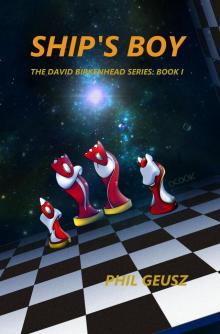 Ship's Boy
Ship's Boy Early Byrd
Early Byrd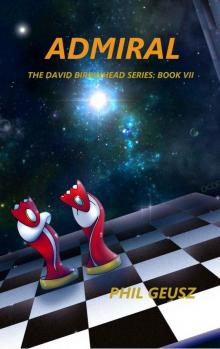 Admiral (The David Birkenhead Series)
Admiral (The David Birkenhead Series)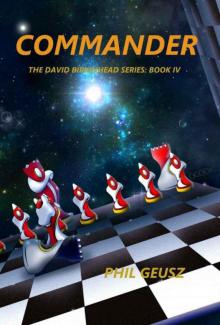 Commander
Commander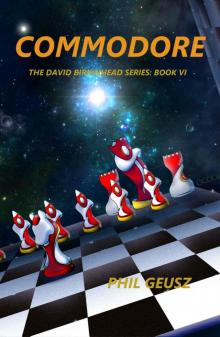 Commodore (The David Birkenhead Series)
Commodore (The David Birkenhead Series)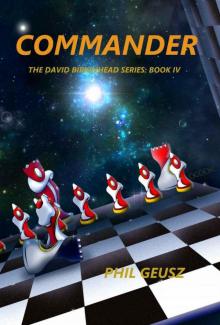 Commander (The David Birkenhead Series)
Commander (The David Birkenhead Series)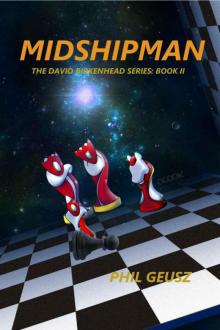 Midshipman
Midshipman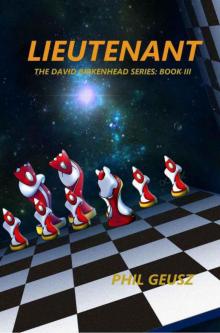 Lieutenant
Lieutenant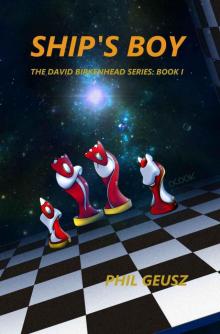 Ship's Boy (The David Birkenhead Series)
Ship's Boy (The David Birkenhead Series)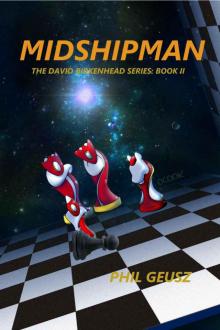 Midshipman (The David Birkenhead Series)
Midshipman (The David Birkenhead Series)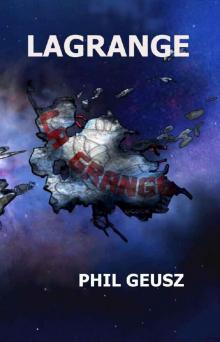 Lagrange
Lagrange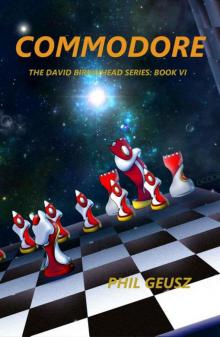 Commodore
Commodore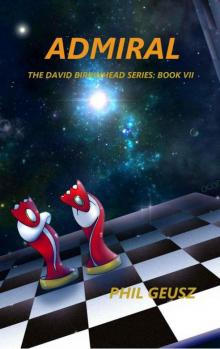 Admiral
Admiral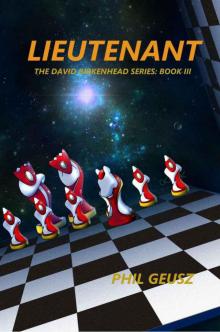 Lieutenant (The David Birkenhead Series)
Lieutenant (The David Birkenhead Series)